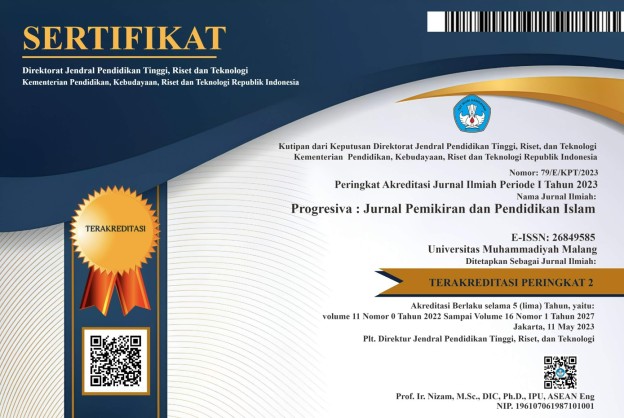Youth Deradicalization Through Educational Institutions: Philosophical Perspective
DOI:
https://doi.org/10.22219/progresiva.v12i01.25529Keywords:
Ideologi, Radikalisme, Deradikalisasi, Kaum MudaAbstract
This article aims to discuss the deradicalization of youths and the important position of educational institutions. The perspective used in this paper is the philosophy of ideological criticism of Jurgen Hubermas. This analysis is used to examine more deeply the ideology and character of the radicalism movement and deradicalization programs carried out by various elements of the nation. By critiquing ideology, we can understand the background of the emergence of radicalism. We can also analyze all forms of expression of resistance to the ideology of radicalism through deradicalization programs, especially through youths. Youths are important to be involved because they are a group that is very vulnerable to exposure to the ideology of radicalism. This paper concludes that to carry out deradicalization, the most important thing is to understand the character and ideology of radicalism movements. This strategy is important because in reality incidents of radicalism continue to occur. Even though the security forces have arrested and detained, even shot dead, the perpetrators of radicalism. This reality shows that radicalism has become a growing ideology among its followers, especially youths. By understanding the character and ideology of the radicalism movement, deradicalization programs among youths through educational institutions will be more effective. Deradicalization programs must also be carried out in a dialogical and humane manner. It is in this context that cultural dialogue involving youths across ethnicities and religions must be carried out in a sustainable manner.
Downloads
References
Abdullah, M. A. (2015). Ummatan Wasathan untuk Indonesia Berkemajuan.
Ahady, A. (1992). The Decline of Islamic Fundamentalism. Journal of Asian and African Studies, 3(4), 231.
Ali, A. M. (1992). Ilmu Perbandingan Agama: Dialog, Dakwah, dan Misi. INIS.
Ali, A. M. (2003). Ahmad Wahib: Anak Muda yang Bergulat dalam Pencarian (I. D. Effendi & I. Nasir (eds.)). LP3ES.
Amar, F. (2018). Darul ‘Ahdi Wasy-Syahadah: Konteks, Makna, Aktualisasi untuk Indonesia Berkemajuan. Al-Wasat Publishing House.
Ayubi, N. (1991). Political Islam: Religion and Politics in the Arab World. Routledge.
Biyanto. (2019). Deradicalizing and Strengthening Civic Values among the Youth: an Analysis of Ideology Criticism Philosophy. PERTANIKA Journal of Social Sciences & Humanities, 27(3), 2143–2151.
Blumer, H. (1996). “Social Movement.” In Alfred McClung Lee (Ed). Principles of Sociology. Barnes & Noble.
Dekmejian, R. H. (1980). The Anatomy of Islamic Revival: Legitimacy Crisis Ethnic, Conflict, and The Search of Islamic Alternatives. The Middle East Journal, 34(1), 1–3.
Dekmejian, R. H. (1988). Islamic Revival: Catalysts, Categories, and Consequences.” In Shireen T. Hunter (Ed). The Politics of Islamic Revivalism: Deversity and Unity. Indiana University Press.
Eck, D. L. (1993). What is Pluralism. Nieman Report God in the Newsroom Issues, XLVII(2), 1–16.
Hadriyanto, B. (2007). 50 Tokoh Islam Liberal Indonesia: Pengusung Ide Sekularisme, Pluralisme, dan Liberalisme Agama. Hujjah Press.
Hardiman, F. B. (2009). Kritik Ideologi: Menyingkap Pertautan Pengetahuan dan Kepentingan Bersama Jurgen Habermas. Kanisius.
Hasyim, S. (2015). Majelis Ulama Indonesia and Pluralism in Indonesia. Philosophy Social Criticism, 41(4), 487–495.
Hidayat, K. (2006). Demokrasi Hak Asasi Manusia dan Masyarakat Madani (Ubaedillah & A. Rozak (eds.)). ICCE UIN Syarif Hidayatullah and The Asia Foundation.
Kymlicka, W. (1995). Multicultural Citizenship: A Liberal Theory of Minority Rights. Clarendon Press.
Lubis, A. Y. (2015). Pemikiran Kritis Kontemporer: Dari Teori Kritis, Culture Studies, Feminisme, Post Kolonial hingga Multikulturalisme. Raja Grafindo Persada.
Madjid, N. (1993). Islam Kemodernan dan Keindonesiaan. Mizan.
Nashir, H. (2017). Indonesia Hitam Putih. Suara Muhammadiyah.
Nashir, H. (2018). Meneguhkan Nilai-nilai Kebangsaan yang Berkemajuan Menyongsong Indonesia Emas.
Pelly, U., & Menanti, A. (1994). Teori-teori Sosial Budaya. Direktorat Jenderal Pendidikan Tinggi Depdikbud.
Rabi’, I. M. A. (2002). A Post-September 11 Critical Assessment of Modern Islamic History. Oneworld Publications.
Rahardjo, M. D. (1993). Intelektual Intelegensia dan Perilaku Politik Bangsa: Risalah Cendekiawan Muslim. Mizan.
Rahardjo, M. D. (2002). Ensiklopedi al-Qur’an: Tafsir Sosial Berdasarkan Konsep-Konsep Kunci. Paramadina.
Roy, O. (1994). The Failure of Political Islam. Harvard University Press.
Shihab, M. Q. (1996). Wawasan Al-Qur’an: Tafsir Maudhu’i atas Pelbagai Persoalan Umat. Mizan.
Sidahmed, A. S., & Ehtesami, A. (1996). Islamic Fundamentalism. Boulder. Westview Press Inc.
Ubaidillah, A., & Rozak, A. (2006). Pendidikan Kewargaan (Civic Education) untuk Perguruan Tinggi. ICCE UIN Syarief Hidayatullah Jakarta.
Wiranataputra, U. S. (2008). Urgensi Pendidikan Kewarganegaraan Sebagai Wahana Pembangunan Karakter Bangsa Indonesia. Pusapom Press.
Downloads
Published
How to Cite
Issue
Section
License
Copyright (c) 2023 Biyanto Biyanto

This work is licensed under a Creative Commons Attribution-ShareAlike 4.0 International License.


















